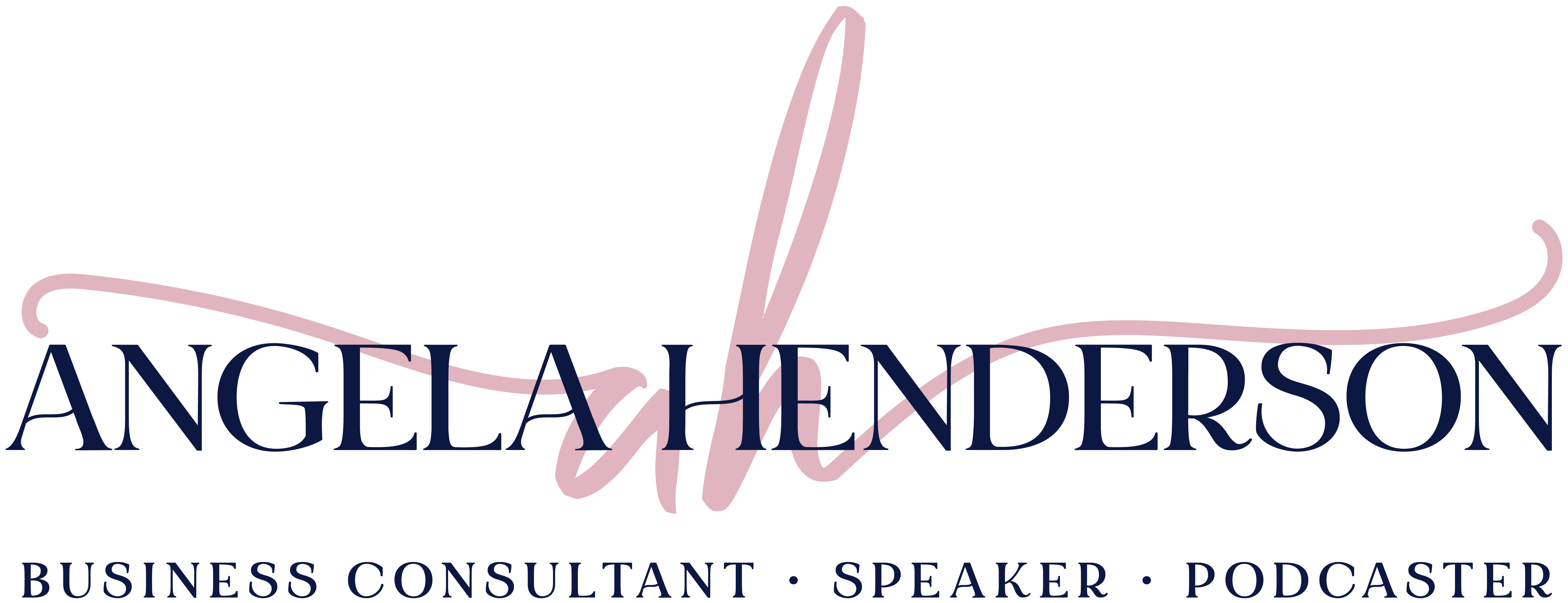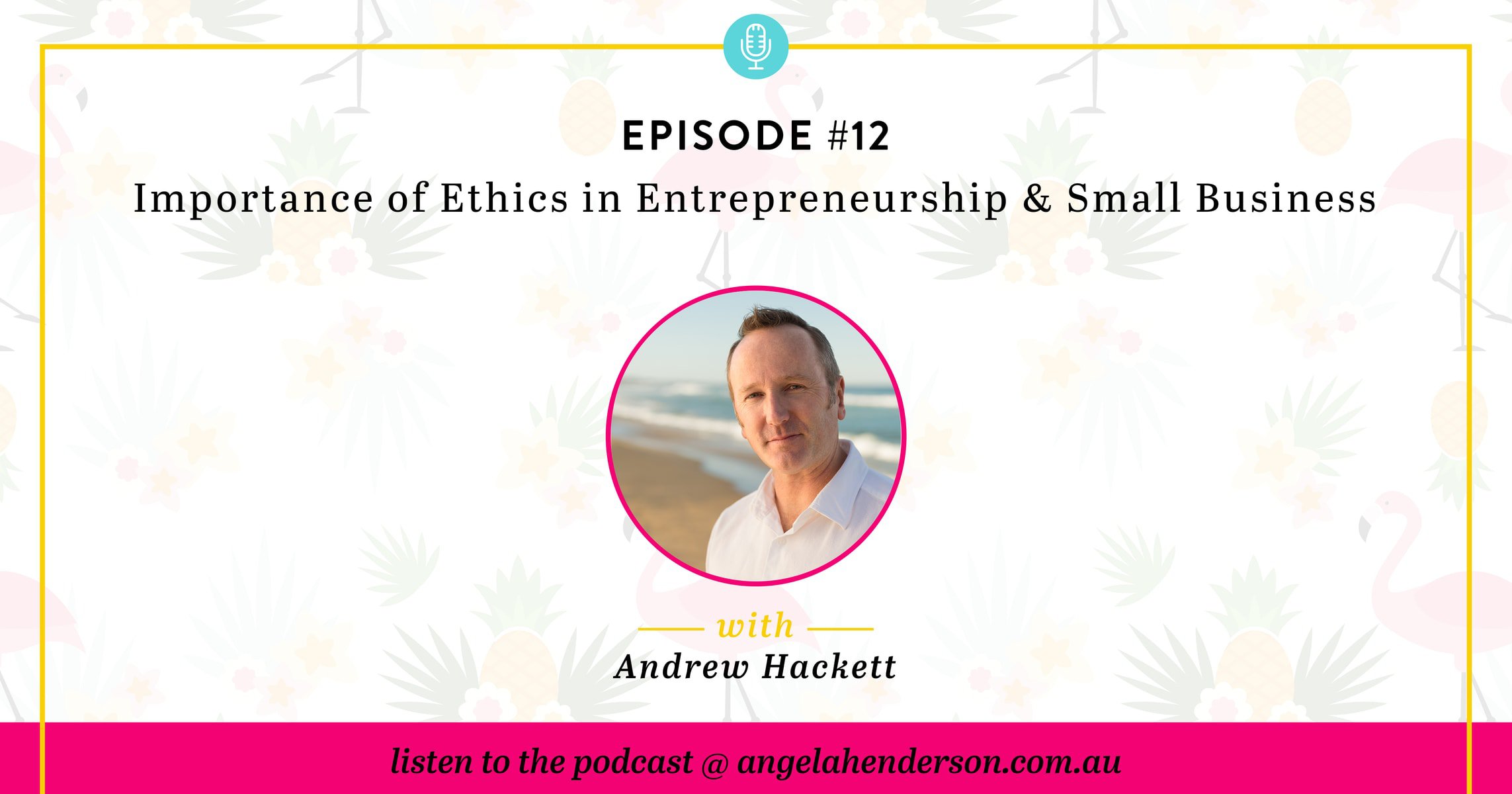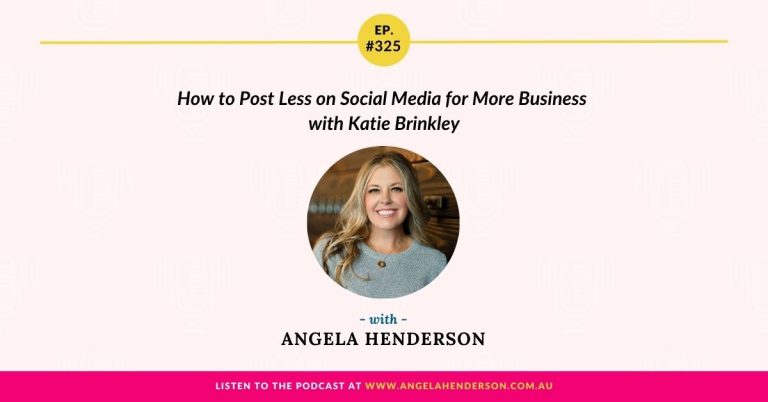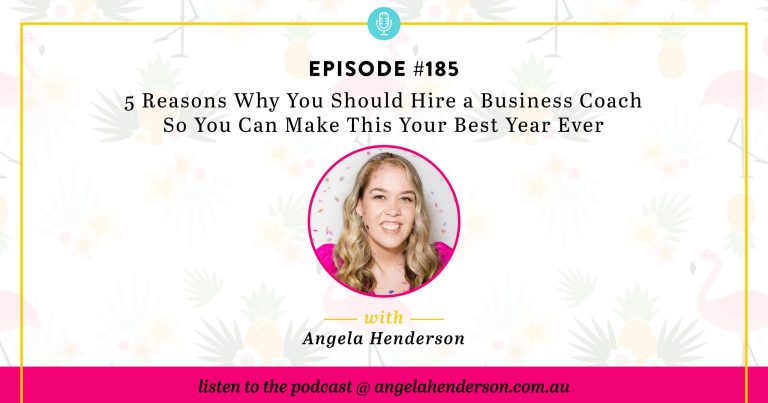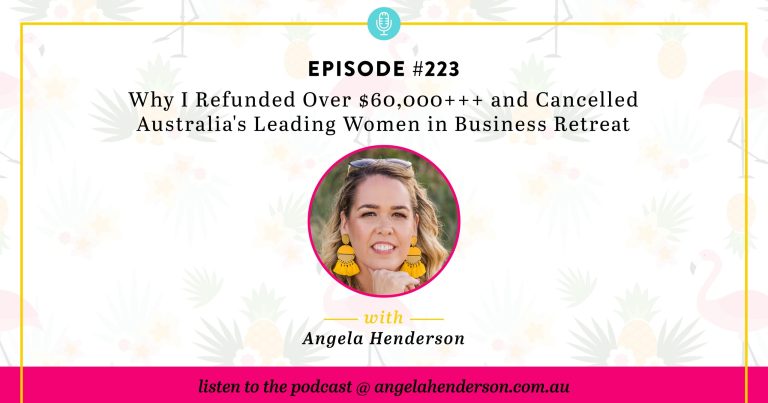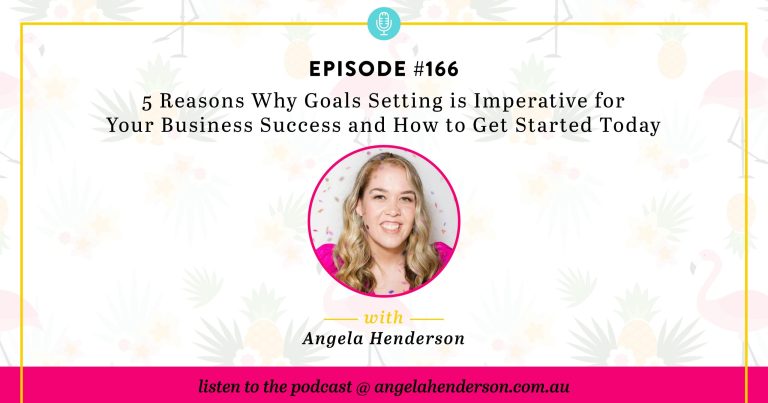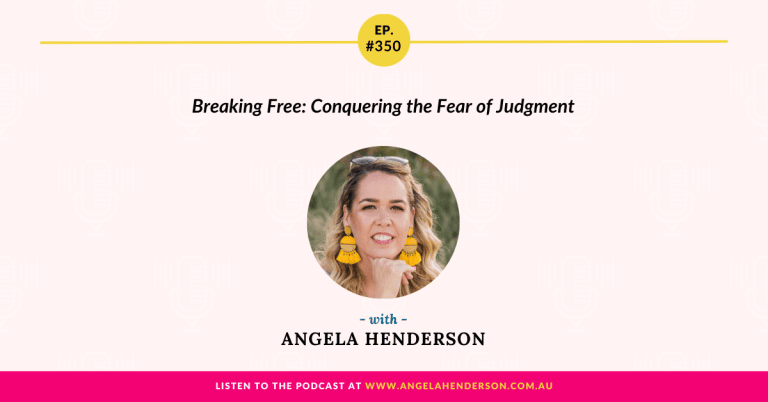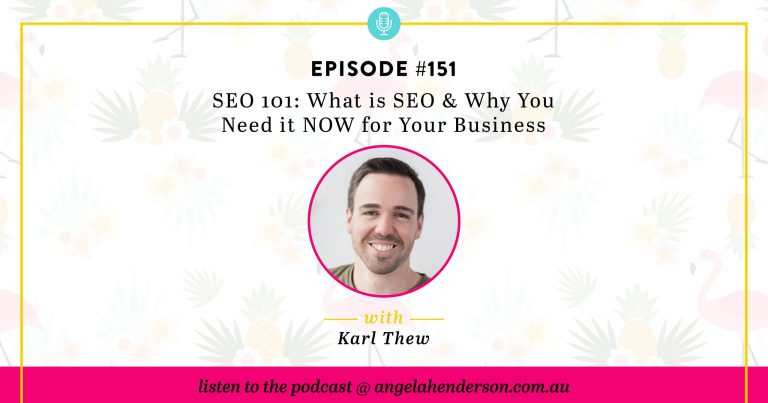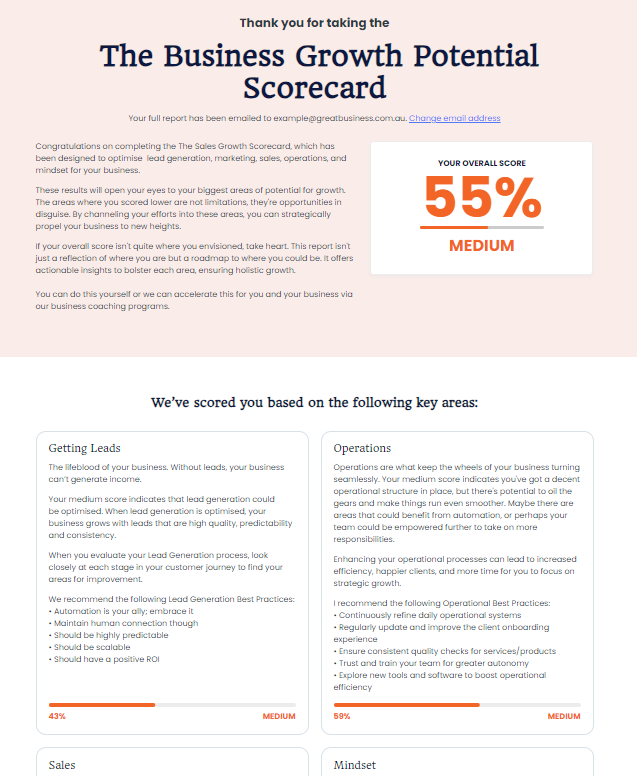In this episode I am joined by Andrew as we talk about the importance of ethics in entrepreneurship and small business. To start, we talk about Andrew as an author and transformational trainer where he helps others step out of their fear-driven state of mind so they can start the life they want to live. He shares with us common fears in the space of entrepreneurs and business owners. We then explore why ethics is important in a business and discuss the top ethical situations that entrepreneurs and small business owners go through. Andrew also gives us core tips on how to remain ethical while running your business and having a solid and sound ethical belief system to create the success you desire.
Important Links Mentioned in the Show:
Andrew Hackett Facebook Business Page
Angela Henderson Active Business Facebook Group
Angela Henderson Facebook Business Page
Prefer to read the Importance of Ethics in Entrepreneurship & Small Business? Here’s the transcript:
ANGELA:
You’re listening to the Business and Life Conversations podcast, with Angela Henderson, episode 12.
Hey there, you’re listening to the Business and Life Conversations podcast, my name is Angela Henderson, and on this show we talk about improving your business, life or both. By having amazing and rich conversations with brilliant guests. Who will inspire you and who will give you tips and tricks, to help you grow both in life and in business.
Alright. It’s another episode of Business and Life Conversations podcast with your host, me, Angela Henderson from Angela Henderson Consulting. Today, we have our first ever male on the show to talk with us about a very important topic in business. The importance of ethics and entrepreneurship in small business.
In today’s show we’re going to explore why ethics are so important when starting a business, what are some top ethical situations that entrepreneurs and small business owners are being faced with today, and what tips you’ll need that are essential to business success while remaining ethical. So, let’s get started. Welcome to the show, Andrew.
ANDREW:
G’day, Angela. Great to be here.
ANGELA:
Great to have you here. And you were just talking prior to it, you are, it looks like in sunny New South Wales today, rock and rolling, working on a few of your books at the moment.
ANDREW:
Yeah, absolutely. Yeah, it’s great. I love my writing. It helps get me in the zone.
ANGELA:
You know, I totally agree. Writing or drawing or anything like that, that you can just step away from technology for a little while I think is so important for your overall health. It’s something, again, we were talking about earlier on. Yeah. So, no, I think it’s great whether or not you’re writing. Yeah, it’s fantastic. But today’s topic is more about not super serious topic, but it is a little bit serious because I think ethics are something that.. It’s not as talked about as often as we probably should be talking about in business. So, before we really get into the more of a serious side of things, I’d like to ease our way into that.
So, my first question for you today is, what is your ice cream of choice?
ANDREW:
Great question, Angela. Look, that’s easy for me. Watermelon ice cream with a waffle cone. It’s..
ANGELA:
Oh, my goodness. Watermelon. That’s amazing. Where do you get such things? I don’t think I’ve ever heard of watermelon ice cream before.
ANDREW:
Watermelon ice cream. Look, it’s an ice creamery type of ice cream. You know those old fashion type of ice creameries where they’ve got them all in the tubs and you have a bit of each? Well, I’m a bit of a watermelon ice cream kind of guy.
ANGELA:
Watermelon ice cream. I think I need to be on the next search for this. This sounds delightful. I did see, I think it’s in China, something where they actually cut a watermelon, scoop it out and then put all the ice cream in the middle. So, your cone is actually the base of a watermelon. It looked really cool when I saw it on Instagram one day. So, yes.
ANDREW:
I wanna try that. That’s for sure.
ANGELA:
And let’s be honest. Who doesn’t like ice cream? The majority of us love ice cream, so I think it’s a great way just to ease our way into this topic about entrepreneurship ethics in small business. So, tell me a little bit about.. Obviously other than the love of writing and the love of watermelon ice cream eating, tell me a little bit about who are and what you do.
ANDREW:
Yeah. Thanks, Angela, again for having me on. I’m an author and a transformational trainer. I’m based on the south eastern coast of Australia. I’ve dedicated myself to help others step out of their fear driven state of mind so that they can start living the lives that they’ve always dreamt about, the lives they were born to live. A number of years ago, I like a lot of people, I came across.. Become disheartened with the lack of meaning in my life.
While I had a great career as a management consultant for some 20 years, I started to realise I wasn’t providing any real value. I just felt like a bit of a paper shuffler. Couple that with the growing need to sort myself out. I had to finally deal with some issues that were created from some sexual abuse I suffered in my early teens. And I realised that I needed to do something about that, something really drastic.
I couldn’t continue to live the life I was living, because my family deserved more and, to be quite honest with you, so did I. That started me on a bit of a 10-year path of self-examination, a bit of philosophical exploration, and extraordinary personal growth to help me realise that everything in the way that we operate, how we interact with others, ourselves and with the universe around us, everything comes down to one or two things.
I was on this journey to break everything that I’ve ever experienced down to the simplest of forms, to their core constructs. I wanted to solve the riddle of our existence, and more importantantly, our interactions with everything around us. Most of this was driven by my need for relevance, my need to leave something behind. Something truly valuable for my children and the world around me.
I realised that my success and my future success was worth something, but I also started a little bit late. I had a desire to know that if I could learn what was necessary to create success, irrespective of what your version of your success might be, and I could repeat it, I could show people how and free them from the lives that have left them wanting. I wanted to help my kids. I wanted to start them early, prove to them also that I’m a mid-forties male, that it’s never too late to try new and exciting things, and show them that we actually don’t have to live with our mind’s self-imposed limits. So, I embarked on this grand journey of philosophical exploration that helped me understand the simplicity of knowing that every thought, every feeling, and every choice we make is based on either love or fear.
It helped me realise that we are the creators of our own existence, and in every moment, we get to choose what our life is based on, whether it’s positive e.g. due to love, or whether it’s a negative experience, e.g. fear. We get to choose in every moment how the universe responds to us. More importantly, what we can create as our lives.
ANGELA:
No, brilliant. And so, when you first started out in that journey, from what I gather and it’s definitely like you’ve moved to whereas your decisions are between love and fear. But would you say at the beginning of the journey that a lot of it was more fear driven than even having the thought of the love choice in there?
ANDREW:
Oh, absolutely. No question about it. In fact, it was living in a fairly constant state of fear as a result of my past. For some 20, 25 years, I had my head in a bottle for a large part of that. I still functioned. I still worked. I still built a career and everything like that, but I was not really able to comprehend everything that was going on. I was living quite unconsciously.
ANGELA:
Yeah, no. You’re able to share that story, but I would say so many others in the world are doing that. Obviously, I told you before. I was a mental health clinician by trade. And you look at some of these, we call them functioning alcoholics, for example. Is they can still have a nine to five job, they can still get up. But when you actually look at the true definition of ‘functional’, yes they were going through the motions, but were they emotionally functioning? Or they may have been physically functioning.
So, it is. It’s very interesting, but there’s so many. I also find in Australia, and I don’t know what your thoughts are, as I’ve travelled a lot. But Australia’s culture around drinking, and that too is quite an interesting culture. I know we’re a little bit off topic, but I still think it goes back to that fear, “Why is there so much alcohol consumption? And is it all driven by fear?” I don’t know.
ANDREW:
Yeah. Look, I believe it’s all driven by fear. And the reason being is because we actually search for the bottle or whatever our drug of choice is. We do it to disconnect from our fears, from our problems. The problem is, it’s only a temporary thing and, in fact, it only makes the matter worse. It was only through effectively hitting rock bottom. And it’s something that I go into great detail in, in my book, that personal story and that personal journey.
It was only though hitting that rock bottom where I was able to see the fear for the madness that it was, which then enabled me to start the journey to actually start to see that love actually was the opposite of fear and that what can come from choosing love-based scenarios and love-based choices and love-based experiences in your life. What actually comes from that is a great response from the universe.
ANGELA:
So, from going from your own transformation and obviously doing consulting and your events and things like that with others, what would you say, before we jump into ethics side of things, what are predominantly the fears you see in the space of entrepreneurship in small business owners?
ANDREW:
Yeah. Look, a lot of them are actually replicated through a lot of fears that people have throughout their life. I talk about, everybody’s in this constant fight or flight state. And it’s not the fight or flight in the caveman’s sense where we’re all getting chased by a bear, where you have this massive adrenalin spike and then this big crash.
It’s a constant low-level fight or flight response where we’re all stressed about, “Will we fit in? Will we be capable? Will we be able to pay our bills? Or will we be able to create success in our life?” This stems across to entrepreneurs as well because entrepreneurs, we really are people to put our all into our work. And our work is often a reflection of where we’re at.
And if we don’t do the work required, then the success isn’t.. We talk about blockages. We talk about not being able to move forward fast enough. And a lot of this is actually because of our own personal state of mind, our own personal level of growth, call it, if you want to. So, I think where a lot of entrepreneurs really fall down is, they have this mindset perhaps that they shouldn’t start something because they don’t know what all the steps are, or they can’t do it because they don’t have the abilities. Whereas successful entrepreneur, the really successful entrepreneurs, they’re not the ones that actually do it. They just know how to find people who can do it.
ANGELA:
Yes, absolutely. And that is somewhat removed. They just do it. There’s a will, there’s a way.
ANDREW:
Correct. Well, the big is entrepreneurs don’t think of things.. They don’t believe that failure actually exists. They just see results. The results just might not what they want. They may not be moving them forward, but they’re just results and at least then they know what not to do. So, they tweak things a little bit, and they try again, and they just keep pushing through.
People often see these apparent failures or these poor results as the universe say, “No, it’s not supposed to happen. Forget about it. Give up on it,” whereas entrepreneurs know, “It’s not the universe’s choice. It is our choice about what we wanna create. And we just need to keep pushing through until we get the results that we want.”
ANGELA:
Absolutely. And I think that so often we are faced with.. Again, you’ve got, “I’m not gonna do this. I’m not gonna do this, because it’s not perfect,” or whatever. But again, I say it often in my earlier podcast is that, imperfect at action is better than no action at all. Again, you’ve got choices to make. Either do the launch, don’t do the launch. Release a new product, don’t release a new product. But the ultimate, like you said, the driving force still comes by us in the choices that we get to make every day.
ANDREW:
Yeah, I completely agree. Absolutely.
ANGELA:
You talked a little bit about your message earlier on. How do you find your message relates to entrepreneurship in small businesses?
ANDREW:
Yeah. Look, a great question, Angela. And look, best answer with the understanding that entrepreneurs are a really special breed of person. But as with any business owner, we put our all into our business. And that’s mainly because if we didn’t, the business wouldn’t survive, because the business is us, at least in the initial stages. Everything that we are is injected into the business. And because we spend all of our time thinking about it, improving it, and making everything more efficient, it becomes everything that we are.
And I think a lot of businesses fail, particularly in the first instances, because people don’t do the personal development work needed to not only get it right, but also to ensure that the best response is actually received. So, that’s why I break everything down to its basic core understanding. What we do, everything we think, feel and every choice we make is based on this love and fear dichotomy.
And if we can implement the practices necessary to have this as a core behavioral baseline within our private lives, not only would our private lives be happier and more successful and better balanced, but this will flow through to our business model. So, what if I were to say to you that there are two clear business models? The two very in a core sense. There’s one where we do all the work, we slug it out, we take, take, take. Or there’s the one where we can get other people working for us, marketing our business for us, and in fact, we can have the universe working for us well. It sounds pretty good, right?
ANGELA:
Oh, you’ve got me.
ANDREW:
Right. And a lot of this is about reassessing what our beliefs are, making sure we’ve got the right belief system in place. This is part of any type of personal develop thing. It is the type of work that Tony Robbins does, and a lot of other practitioners do as well. People listening will know how important their beliefs are, particularly in their private lives, but also to their business lives.
And companies spend a lot of money on creating the right values across their organisation, in the hope to shake the beliefs of their staff and customers to suit their goals for the forward direction of the company. We often do this intuitively, or be it unconsciously. And all I’m trying to do is to bring that conversation to the front line, so we can stop ignoring what we don’t understand and start understanding what we really want to have working for us. I believe that the core of every great startup nowadays is some altruistic agenda, something that someone’s trying to do that is great for the world. I believe that ultimately, within us we’re like superheroes. We’re just waiting for our time to save the world and we’re waiting for our time to come up with a great idea or a great perspective on things.
That was a lot about me. I felt like a bit of a superhero with no cause for a vast majority of my life. Then I suddenly realised what is unique to me and my experience. And then, I started to piece together what my purpose in life was. Yes, particularly when it comes to business, sometimes we get lost along the way. And some companies, they can become a bit big and powerful, and they let the ego get in there, and they start focusing on money, money, money, bottom line, bottom line, bottom line. And I’m not saying that the core business practices of any good company are any different for a small business. What I’m trying to say is, if we can inject a strong ethical baseline into what we’re trying to do, and we try to and build that into our core belief structure, and the rules of that belief structure creates, and the behaviours that come from those rules, well, then we can build success in our life quite easily.
It’s easy to focus our decisions on what makes us the most money. And look, to be quite honest, making money is actually easy. Anybody can do it if they know how. What has real value to the world is where the real success comes from. And I believe that is creating opportunity and success in others.
ANGELA:
And in order to create opportunity and success, I guess there has to be probably some level of that ethics, which we’re gonna get into very shortly. But before we jump to that, tell me though with the ethics side of things, when the viewers hear today ‘ethics and entrepreneurship’, I want them to have a clear understanding, because that is quite a broad term that could be perceived differently from anyone in any backyard in any country. But for today’s purposes, can you tell me specifically what ethics and entrepreneurship means to you, so we’ve got that baseline formed?
ANDREW:
Yeah. Look a great question again. And look, ethics is different to everybody, because we all come from different religious beliefs, we come from different cultural backgrounds. What is right and wrong is different for everybody. What I believe that the ethics aspect, in regards to entrepreneurship at its core baseline, is doing the right thing. Doing the right thing, not just from a personal perspective, but from a business perspective. And we see this all the time. And it’s almost like there’s this great worldwide movement happening and amongst entrepreneurs where they’re actually trying to build businesses based on ideas that are right for the world, that are good for the environment, that are helping people create more sustainability, more environmentally friendliness. That sort of stuff.
Businesses all over the world are doing this as a point. So, we all have the right to decide on what our own ethical baseline though. I wanna stress this point. There’s no judgment from me about what you choose as your business model. All I’m saying is that when you do it, think about are you doing it based on love or are you doing it based on fear? Because, look, to be quite honest I see this particular issue come up in network marketing companies a lot. And particularly in Australia. We have this ingrained, “Oh, my God. There’s a network marketer trying to contact me.” And look, to be quite honest with you, the issues that happen in network marketing is because of a lack of training, a lack of understanding, a lack of an actual proper sound structure and approach. They sign these people up and let them fend for themselves, and they run around in a panic. There seems to be this ingrained culture that you have to put others down, or if someone turns around and says, “No, I don’t like your product,” or, “I don’t like your business idea,” that it’s some sort of a personal attack when in fact it’s nothing of the sort.
When we’re thinking of ethics, we need to think about what are we doing and are we doing the right thing, or are we just chasing money? If it’s just money, if you’re just literally chasing money, then that’s okay. That’s your choice, and I’ll respect your right to make that choice. But I believe that if we do something right, if we have the right ethical foundation behind what we’re doing, the universe’s response back to us, the way our customers interact, the way opportunities are created, the universal response is also altruistic. Is also based on love. And in fact, the money, the success, all that sort of stuff, comes from that ethical approach, comes from that altruistic, doing something for the world or doing something for the greater community.
ANGELA:
No. I often talk about this. Natasha Corbin, she’s one the ladies where I’ve talked about this before. And we talked very clearly about money mindset and what are you offering and what are you giving back? And how it all collectively comes together as one. And that too many times, if you focus on one or focus on the other, again, fear can start to get driven in when it doesn’t need to be. If you go back to that core, you’re doing the right thing at all times. The universe or etcetera will always continue to help you out regardless of it. But for ethics, from your point of view, why are ethics so important in starting up a business?
ANDREW:
Yeah, look. This is where I think we need to get it right and we need to get it right from the beginning. Most people start a business with an idea, and it’s the start of the manifestation process. The thought that creates it all. However, if we were to approach it with an ethical foundation that everything happens from the greater good, everything we’re trying to do is from the greater good. What we’re doing is in fact, we’re sending that signal out to the universe, which gets reflected back to us. Some cultures refer to it as karma. What you put out, you get back. From my belief system and what I try to teach people is that any idea can be a good idea if it’s approached in the right way. And if we’re looking at it from a strong, ethical foundation, then we can move forward. And more to the point, more and more people will get people will get behind it. They add to that energy. They increase that signal or that frequency towards the universe.
You look at Tony Robbins as a primary example. We all think of Tony Robbins as a highly successful guy. But really when it comes down to it, he’s entire business model, his core business model was built from the ground up on helping others, on creating success in others. That is his business model. It’s really simple. But in creating success in others, they then get excited about it as well, which adds to the energy on it. So, then they’re trying to create success in other people, and then it’s.. Look, it’s like the ultimate pay-it-forward response. But then, what he does, because of that strong ethical foundation that what his core thing is trying to do.. It’s not actually about money. It’s actually about helping others. And what is he worth nowadays? He’s worth about $500,000,000. I believe he’s..
ANGELA:
My gosh. I would love to see his bank account, but yes, I don’t know. It would be lovely to see the zeros.
ANDREW:
Yeah, absolutely. But a lot of people don’t know that he spends tens of millions of dollars a year on feeding people.. He’s got this Feeding America Foundation that spends a lot of time and effort on feeding millions of people a year in America. Now, to me, that is not only remarkable and really truly beautiful. But more to the point, it’s increasing this beautiful energy around it, which is felt by everybody else, which then flows back to him because it all comes almost like some strange pyramid scheme where the person at the top, all their attentions are flowing down and everybody else is getting behind it. It’s really the basis of what all great movements we see around the world start from. And there’s no reason why a business can’t lead that or a business can’t take that off and run with it.
ANGELA:
So, I think it all sounds great from that point of view. Again, like I said, I’m a firm believer of people.. If you speak with people, people say I’m a bit of a connector, I believe there’s enough wealth for everyone in the world, I believe that we.. Yeah, there’s no need for competition because there’s enough for all of us to go around. So, I’m constantly about connecting. But not everyone obviously comes from that point of view.
ANDREW:
Yeah.
ANGELA:
So, yeah. And when we’re not from that point of view, sometimes there can be a disconnect with your audience, your community, whatever, because their ethical definition like you talked about is very different. But if we talk about just today what you’ve talked about already and what our main messages are today, what are some of the top ethical situations you see entrepreneurs facing in business today?
ANDREW:
Yeah. Okay. So, that’s a great question, and probably best responded to that with, what might be those big misconceptions that lead to those ethical situations? One of them may be, there’s not enough to go around. A lot of businesses think, “Oh my God. We’ve got to steal my competitors’ clients. We’ve got to grab their customers.” Look, it’s a complete load of rubbish. There is enough to go around. If you are doing what is right for you and what you believe is right for the world, and all that sort of stuff, people will come out of the woodwork. Doesn’t matter if they’re spending money elsewhere. Doesn’t matter. They will start spending money with you.
Another one might be that, putting others down is the only way to the top. Climbing the people rung, you’re stepping all over the top of the people to get to the top. Well, you know what, that’s an egoic madness going on there. If you’re putting other people down, the universe is going to reflect that back to you. If you’re building other people up the universe will also reflect that back to you. So, doing for others and building other people up, I believe, is the better way and the faster way to create a successful business.
What about the management of staff? The management of staff is more effective through control and dominance. People think that that is even the way to do business nowadays, whereas it’s easy to control people through fear. Everybody knows that, but enabling people through love is a really beautiful approach, and you get more out of people that way. You know, true leaders are not the ones that are the most successful. True leaders are the ones that create the most leaders. And if you want your staff to take initiative, if you want your staff or the people working in your business to add the right type of energy, you need to give them the right type of energy in the first place as well.
Another one. Lying to clients to get business. People think that that’s okay. In my language that’s not okay, in any language. A lie is a lie, and I believe all lies eventually come undone. That kind of fits in with the idea that selling dodgy products or services is okay. And I see this a lot actually in Alliance marketing models, where people buy access to something, and franchises are a little bit the same sometimes. And people get caught up in this, “I’ve just gotta sell, sell, sell. It doesn’t matter actually, if I’m providing value and it doesn’t matter if my products are a poor quality.” But then they start to question why things aren’t moving forward, why things aren’t growing the way they should. If you’re not doing a good job or you’re not selling the right service, people just won’t refer you. All businesses grow through referral. That is 10 times more powerful than any other type of advertising you can possibly do.
ANGELA:
And I also think though, that people are, whether or not it’s fear or ethics or whatever, but people are also just looking at people as a number. It’s like, “Get the people in and I’ve got my money and see you later.” And they’re spitting them out as quickly as they can get them in. And I think, again, if you go back to, “What are you doing in your business, and are you doing the right thing?” If you’re doing the right thing, in my view, is you’re going to treat them just as nicely post a sale as you are prior to the sale. And you’re still gonna like, “Hi, how are,” as a business consultant, I still check in with my clients who have graduated and moved on. Like, “Hey, how are you?” You see them on the street, “Hey, how are you?” give them a hug. I’m never just gonna snob them because they’re not paying me anymore. The world doesn’t work.. Well, I would like to see the world not working like that. It does work like that, but again, I’m a firm believer that post sale you’re still nurturing those relationships all the time.
ANDREW:
Yeah, look, this is something I talk about quite a bit in regards to the fact that we all seem to living in this search for meaning sort of crisis. Now, we all want meaning in our lives. We want to offer meaning and we want to receive meaning back. I think what you’re talking about is exactly that. Businesses who nurture the relationships, and they do it genuinely so, not through automated bots and stuff.
Although I can understand that they have their time and their place. It’s the same with funnels. Using click funnels and all that sort of stuff to try and sell your wares is all good and well, provided you’re selling something that’s consumable. If you’re selling something that’s a heart-sell business model that is about connection, you need to nurture those relationships. As you say, before and after the sale, because that’s really what generates that repeat business.
ANGELA:
Yes. And, with repeat business, like you said, there’s so much good that can come from it. And like you said, people who are working together collaboratively, you’re moving up in the world and giving out to the world and that energy works hand in hand.
ANDREW:
Absolutely. It’s like anything. You think of a major movement that has happened in recent history. Someone came up with the idea, they spoke to a few other people who related to that idea, and they all went, “Yeah, let’s put some energy behind this,” and they all work together. Eventually more and more people join that movement.
A business is no different. If you can convince people that your idea is for the betterment of everybody involved, I promise you they’ll jump on board with that energy. It doesn’t matter what your main communication channels are, whether it’s social media or whether it’s in-person communication, dealing with clients one-on-one or in groups like I do. Getting that message across. What do they say about any good brand? It’s not just how you look and how you sound, but it’s more importantly about how people feel when they leave you. And if they feel good, and they feel good about what you’re trying to do, and they feel good about your message, they will remember you. And they will tell someone else when the time is right.
ANGELA:
No, hands down. And so, obviously there’s probably a million that you could tell us, so what tips do you have that are essential to business success for entrepreneurs and small business owners while remaining ethical? What would you say for those who are just starting out, or for even those who have been in it for a long time? Do you have like a, “Hey, you need to really check yourself and think this.” Or, what’s kind of the core tips that you could give people to start really reassessing where they’re at in business and their ethics, today when they’re listening to this episode?
ANDREW:
You look from an ethical point of view. That’s a really good question, because it’s really difficult sometimes to get across to people how important that is. But ultimately it comes down to what our core beliefs are. Now, I went through a process which I kicked off just over 10 years ago, which had me re-examine my core belief structure. I started to realise that a lot of the beliefs that I had were in fact actually working against me. So, by looking at these core beliefs and understanding which ones were working for me and which ones weren’t, I had the opportunity to reflect on those ones that weren’t working, and then try and figure out, “If they’re not working for me, how can I get them to work for me? What new beliefs can I put in place?”
A lot of people think that our belief structure is set in stone. It is who we are and it can never be changed, which in fact actually couldn’t be further from the truth. When we’re born we base our initial set of beliefs, up until about the age of 10 or 11, on our parents and our siblings. When we start entering into our teenage years our beliefs change and they start to focus more on cultural influence, they start to focus on people we look up to, people we admire.
The baseline is still a little bit intact at that stage, but then when we leave home, we move into the workforce, our belief systems change again. So, as we’re going through the first sort of 20, 25 years of our life, our belief systems have changed automatically, just by default, without actual real examination at least two to three times. Now, the problem is, is most people don’t re-evaluate their belief system until they experience their midlife crisis into their 40s or early 50s. And it’s, what’s happened there is, the midlife crisis is in itself, it’s actually caused by a disjoint between their old, out of date belief system, and their new desires of how would they like their life to be. So, if we can actively engage in a conversation about, “What are your beliefs? Are those beliefs working for you or not? And if they’re not, what could we change them to, to enable success?” then everything changes.
Part of that discussion is introducing an ethical platform into your business. Sometimes, and even in the business that I do, in helping people and committing to working with people to change their lives, sometimes I sit back, and it’s usually, strangely enough, might surprise you, when I’ve got bills to pay. And sometimes I sit back and I think, “Hold on a second. How do I do monetize this? How do I make money out of this?” And I have to stop and remember, I’ve got to go back to my core, “What am I trying to do? Why am I trying to do this?” And that’s where my ethical platform comes from, because I keep saying to myself then, if I just focus on helping people, if I just focus on what my purpose is, if I focus on what I’m here to do, then the money will come.
And it always does, and it always have. In fact, it comes in spades. If you’re doing that right. If you’re leaving people with such an extraordinary level of value, that they then have to tell everybody else because they’re so excited. I’m telling you right now, your business will be unstoppable.
ANGELA:
Yup. No. And I would agree with you, hands down. But I think it’s about people.. Again, we’re very busy, aren’t we? It’s like, go, go, go, go, go. I just don’t think people are taking the time to sit in that and explore and examine their ethics, their beliefs, their values. They’re too busy. But I think if they allow themselves that space to do that, there’s, I would go, there’s nothing bad that can come from that. You might have to sit in some stuff for a minute, but the outcome is far greater than you not looking at that any longer.
ANDREW:
Look, absolutely, I agree. And for me, I use a bit of a formula for success, which incorporates a process that anybody can use. And it doesn’t matter what success means to you, it’s irrelevant. But, I refer to it as B plus I plus A plus S equals success. So, it’s our beliefs, plus our intention, plus our actions we take on that intention, plus how we surrender the process and its influence from the universe, that all creates success in our lives. So, our beliefs are fundamentally important. I mean, there’s no question about that because that is what is the sound foundation that the building is built on. The intention is effectively the statement that we’re making. What are we doing? What is the commitment we are actually making to the greater world about what we’re trying to create?
Actually, Tony Robbins will tell you, “Take massive actions every single time,” and that is absolutely true. The universe can’t take the action for you. You are the person that takes the action for you. The universe can influence, it can provide subtle opportunities through other people and things like that, but you’ve got to listen, and that’s where the surrender comes in. A lot of people struggle with the word surrender, and what I’m talking about there, is I’m talking about, “Surrender your process of how it must happen.” Don’t sit back and go, “It has to follow A through to Z. It has to follow this particular straight line.” You know, success is all over the place and it comes from trial and error.
But more to the point, if we can quietly sit quietly now and then. I talk a lot about meditation. I talk a lot about the benefits of getting into nature as well, to reflect. If we can sit quietly, we can often hear the instruction coming through from our intuition on what to do next. Too many people think they’ve got to know what all the steps are before they move forward. Whereas I say, when you walk up a staircase. Say it’s a spiral staircase. Do you need to see exactly where each and every step is before you start walking up? Of course, we don’t. We just start walking. Because we only see the next two or three steps. Well, building a business is no different. If we can see the next couple of steps, well then we know that when we get to that third step we’re gonna see a couple more, aren’t we? And then when we get to the sixth step we’re gonna see a couple more and so forth. And eventually, by the time we get to the top we’ve realised that we’ve walked all those steps and everything else is in the past and we’ve actually arrived at our destination. So, this is why the ethical platform is really important, because with the right ethical platform, what we are putting out will be in fact reflected back to us by the universe.
The universe will give back to us the success that we enable in others, the opportunity that we create in others, and all this sort of stuff. The world is very much caught with the idea that we must purchase something to fix our problem. It’s what entire marketplaces are built on. We have a problem, surely there’s something out there in the marketplace we can purchase that will fix that problem. The challenge with that though, is that’s only a temporary fix, it’s only a temporary resolution.
And that’s where this personal development, this journey that we must go on, particularly as entrepreneurs, because the business is reliant on us, the people we hire are reliant on us. And if we haven’t done all that personal growth, we haven’t travelled that journey necessary to have a belief system that is solid and sound, ethically driven, that we’re not going to be able to create the success that we really, really desire. And more to the point, the universe isn’t going to be able to reflect back to us the success we need for that success to be manifest as well.
ANGELA:
100%, because if I go back to what we’re saying though is that, all of these beautiful stages that you’ve talked about, again, it’s those entrepreneurs who are willing to sit and do that work, will exponentially grow. And then there’s people listening who are gonna be like, “No, I’m not gonna do it,” right? So, again, it comes back to those choices; love and fear.
What are we gonna do? Are we gonna embrace the love, are we just gonna put fear to the side and keep doing what we’re doing, thinking that it’s working for us? When a lot of the times it doesn’t take rocket science to fix things, or people, you mentioned are focusing on the wrong things. I think business owners, especially new business owners are constantly going, “What program do I need? Am I going to do QuickBooks or Xero? Do I need this email Convert Kit or do I need MailChimp? Do I need this or do I need that?” And they’re focusing on all these technical things for their business, but they’re not actually starting at the root of their business, and looking at those ethics, those beliefs, their value.. Or, the values that kind of core system, that is ultimately going to help to germinate and perpetuate that ethics. I don’t know, what are your thoughts about that?
ANDREW:
Yeah, look, absolutely, I agree. What do they say? Success comes to those who actually consistently apply what is needed for success to arrive. We’ve got to do the work. People are too readily looking for shortcuts. When my book was released and it went international bestseller across the U.S. and across Australia within 24 hours, which blew me away. And everybody sat back and they thought, “Wow, that’s success. That’s an overnight success,” and they didn’t realise it was five years good hard work that went into it. Entrepreneurs face the same thing. Their business suddenly takes off and the press gets a hold of it or you see it on Facebook, and everything’s, “Wow, that’s amazing.” They don’t see the five, 10, 15 years that has gone into it.
There is no shortcut. You have to do what is required for things to materialize. You can speed up the process, and you can get help, and you can buy the advice of the right people, and you can get professionals on board, absolutely. That just speeds up the process. It doesn’t stop the fact that the work still needs to be done.
ANGELA:
The work’s still getting done. You’re just choosing to outsource the work versus doing it all yourself. So, you’re still making choices, aren’t you? So, dude, what a great conversation, because to me, ethics is super important for me. My core is always, “Alright, just do good and good will come back to you. Be kind to others and that kindness will come back to you.” And even in my kids, I just want to teach the core things; manners, kindness, love, and to me, everything else will kind of just rock and roll from there. But, in regards to you though, what’s next for you and how do listeners connect with you?
ANDREW:
Yeah. Well, connecting with me is pretty easy. Obviously, I’m on Facebook and I’m on Instagram, if anybody wants to message me. I get back to everybody that does contact me. Otherwise, you can go to www.andrewhackett.com.au, if you want to check out my work. You can also grab a copy of my book, Free from Fear, there as well. It’s also available on Amazon and Fishpond and everything else.
I also have a new five book series coming out later in the year. Hopefully from October, but five book series breaks down the whole creation process step by step. It will lead you through everything from reevaluating your belief system, through to how the universe works in response to your desires, through the manifestation process to create success in your life and your business.
I’m really excited about that. That’s a piece of work that I’ve been working on for quite some time now, and it’s all based on the work that I’m doing with groups, and all based on the work that I’m doing with individuals alone. So, this process and that secret formula, it has been tried and tested time and time again across quite a range of different people in trying to create different businesses and trying to create different change mechanisms in their lives.
ANGELA:
Sounds super juicy.
ANDREW:
Sorry?
ANGELA:
I said, it sounds super juicy and exciting.
ANDREW:
Yeah, look, I’m really excited about it, to be quite honest with you, and the people that have been working on it with me are really excited about it too, which is absolutely fabulous. I can’t wait to start getting that out. So, anyway, I also have, and you can get this information on my website. I have one and two-day programs where I present my Free from Fear program, which is a breakdown of the core principles associated with what people need to do in their lives.
That’s been getting some great reviews and having some great success with that, so I’m really proud of that piece of work as well. I do, do that through a couple of events each year but if anybody wants to get a group of people together and give me a yell, I can come out and have a chat to you about all of that as well. That’s pretty easy to set up.
ANGELA:
Oh brilliant. That’s great, because I think, again, group work can be for those who that are kind of like, “Ugh, what do I do? I’m nervous to do it on my own.” I always say, group work has just as many, if not more, benefits when you do it collectively. Yeah, I just think, yeah. So, yeah, those of you out there that do need any assistance, make sure you contact Andrew on that. Before we go though, I’d love to know, what mantra, at the moment are you kinda following? What’s your go-to, keep in your head?
ANDREW:
Yeah, look, I like to keep my mantras pretty simple, to be quite honest with you. My mantra of the day at the moment is, “The consistent application of what is required will always deliver success.”
ANGELA:
Oh, good one. So, consistency really.
ANDREW:
Yeah. Just the consistent. A lot of people, they start off on a process, something happens and they sit back and go, “Oh, no. That didn’t work,” and they kind of give up at the time. And I just say, “Keep consistently going at it. Focus on your dream. Focus on what that destination is. Allow for influence and opportunity to come into your life. And just keep applying what is required. Keep doing what is required, because, if you do, success always arrives.”
ANGELA:
Yes. But again, it’s that, so many people are gonna have choices. Is fear gonna get in the way? Are you gonna genuinely commit to that process and that love and keep on going? Because, you know, we’re all gonna have failures. Some are big, some are small, but it’s how we choose to handle those that, to me, keeps us moving forward.
ANDREW:
Absolutely. Everything is a choice and the choice is ours.
ANGELA:
And for those of you that are going, “Okay, this is pretty deep. It’s pretty meaningful. How am I gonna apply this to the business?” I’d really encourage you to grab a piece of paper and pen, take a minute to reflect on what your purpose is, what your values are, what your beliefs currently are. And again, if we go back to the beginning of the thing is, are you doing the right thing in your business right now? Are you doing the right thing? Are you only after money?
But really, collectively, take a look at those core things. Your values, your beliefs, are you doing the right thing? This is gonna help shape you where you are now and where you’re going to go with your ethics and entrepreneurship and small business. Thank you so much, Andrew, for being part of today. It has been a pleasure, and as I said, having you as a first male is a milestone for me, so thank you for coming on board. I appreciate that.
ANDREW:
You’re very welcome, Angela. It’s been an absolute blast. I’ve really enjoyed it. Thank you.
ANGELA:
And for the rest of you, just a reminder that my team and I will also be putting together the whole transcription of this episode at www.angelahenderson.com.au, and of course I cover all sorts of related business and life topics inside my Facebook group, The Australian Business Collaborative, with over 3,000 different businesses. So, make sure to join the community as I’d love to see you in there.
For the rest of you, have an awesome day, no matter where you are in the world and I look forward to having you join me on my next episode. Have an awesome day everyone. This is Ang, from Angela Henderson Consulting.
Thanks for listening to the Business and Life Conversations podcast with Angela Henderson about the importance of ethics in entrepreneurship and small business. www.angelahenderson.com.au.
